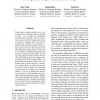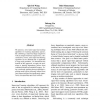ACL
2008
14 years 1 months ago
2008
This paper proposes a method to correct English verb form errors made by non-native speakers. A basic approach is template matching on parse trees. The proposed method improves on...
ACL
2008
14 years 1 months ago
2008
We propose a language model based on a precise, linguistically motivated grammar (a hand-crafted Head-driven Phrase Structure Grammar) and a statistical model estimating the proba...
ACL
2008
14 years 1 months ago
2008
People rarely articulate explicitly what a native speaker of a language is already assumed to know. So to acquire the stereotypical knowledge that underpins much of what is said i...
ACL
2008
14 years 1 months ago
2008
ACL
2008
14 years 1 months ago
2008
Discriminative feature-based methods are widely used in natural language processing, but sentence parsing is still dominated by generative methods. While prior feature-based dynam...
ACL
2008
14 years 1 months ago
2008
This paper demonstrates a new method for leveraging unstructured annotations to infer semantic document properties. We consider the domain of product reviews, which are often anno...
ACL
2008
14 years 1 months ago
2008
We present a novel semi-supervised training algorithm for learning dependency parsers. By combining a supervised large margin loss with an unsupervised least squares loss, a discr...
ACL
2008
14 years 1 months ago
2008
Large-scale discriminative machine translation promises to further the state-of-the-art, but has failed to deliver convincing gains over current heuristic frequency count systems....
ACL
2008
14 years 1 months ago
2008
We present a novel approach to weakly supervised semantic class learning from the web, using a single powerful hyponym pattern combined with graph structures, which capture two pr...
ACL
2008
14 years 1 months ago
2008
We extend the classical single-task active learning (AL) approach. In the multi-task active learning (MTAL) paradigm, we select examples for several annotation tasks rather than f...


